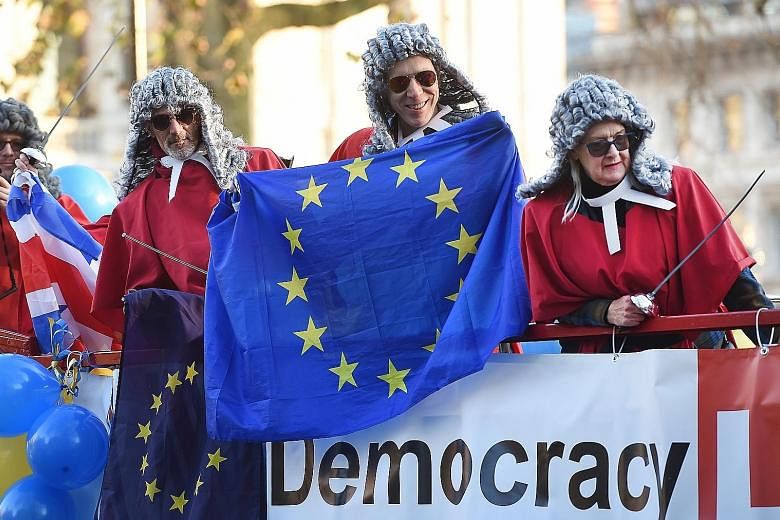LONDON • British Prime Minister Theresa May faces a landmark court ruling tomorrow that could put a dent in her Brexit plans by handing control of the process to restive lawmakers.
The Supreme Court will decide whether she can use her executive power to begin formal talks on leaving the European Union, or whether she must seek approval from Parliament.
The 11 judges are widely expected to back an earlier High Court ruling that the magnitude of Brexit means the process to instigate it can be introduced only through formal legislation.
Mrs May has promised to trigger Article 50 of the EU's Lisbon Treaty, beginning two years of divorce talks, by the end of March.
In the event that they lose the case, ministers are preparing to rush emergency legislation through Parliament.
Opponents would almost certainly table amendments to try to tie the government's hands in negotiations, for example on the rights of EU citizens already in Britain.
But the vote on Article 50 should pass, because although Mrs May has only a slim majority, the main opposition Labour Party has agreed not to block it.
The Supreme Court ruling may yet create further complications, including whether the devolved governments in Scotland, Wales and Northern Ireland must approve Mrs May's plans.
And last week Mrs May promised Parliament a vote on the final Brexit deal - raising the prospect, however remote, that MPs could reject it.
The original High Court decision in November drew outrage from Brexit supporters, who accused the claimants of trying to undo the result of last June's EU referendum.
One tabloid newspaper condemned the judges as "Enemies of the People" - and tensions are still running high.
But associate law professor Jo Murkens at the London School of Economics said the case was about the limits of the government's "royal prerogative" powers.
"It would be much easier if the Prime Minister could just do as she pleased using prerogative power. The problem is that the courts have not allowed that since the 17th century," he said.
He said a ruling against the government would be unlikely to bind its hands, but would clarify that "there is a proper process and it's (through) Parliament".
"If you've got a majority then you're in the clear - but if you don't have a majority, you've got a political problem," he said.
Mr Tim Bale, professor of politics at Queen Mary University of London, said Mrs May's biggest problem "is not the people behind her or in front of her in the Commons. Her biggest problem is the 27 heads of government who she has to negotiate with".
AGENCE FRANCE-PRESSE

